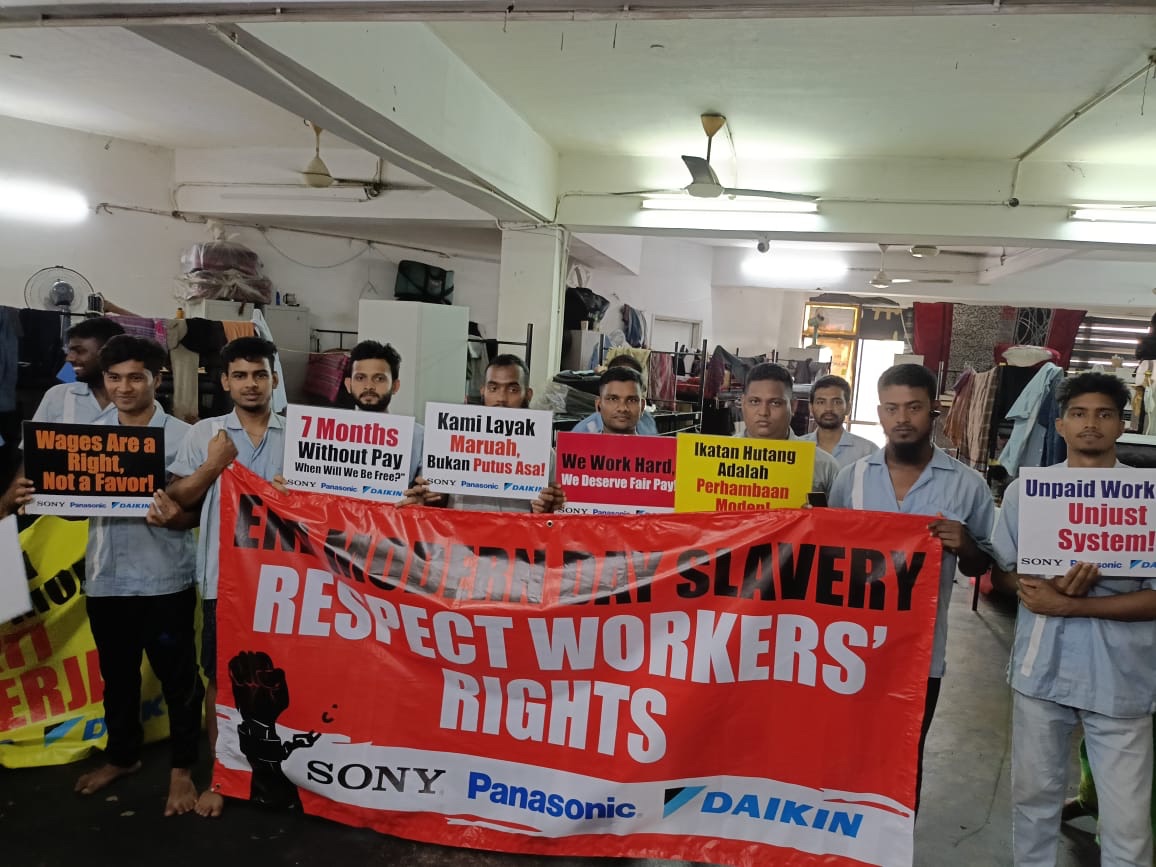Over the past few weeks the shocking scandal of the unpaid migrant workers in Malaysia’s Kawaguchi Manufacturing Sdn Bhd has unravelled in the media thanks to courageous campaigning by the workers’ rights advocate Andy Hall of the Responsible Business Alliance (RBA) and brave workers themselves, forced to stand up to exploitation as their funds to feed themselves and families back home ran out.
Thanks to that campaigning, one of the buyers of the products, Japan’s Daikin, last week intervened to proffer a finance and medical support package for the workers who have not been paid by their direct employers in Malaysia for over half a year.
On Christmas Eve the Malaysian Labour Department also indicated it had reached a settlement whereby Kawaguchi has agreed to pay its forced labourers what they are owed after months of privation.
Let us see how that works out. Meanwhile, there is apparently no Malaysian government provision or insurance plan for such eventualities despite a proactive policy of mass recruitment of registered workers from abroad and the huge sums raised in fees for visas and all the rest.
In just one example of the pernicious situation facing migrants, if a worker falls sick in Malaysia they have no access to the state health care system and there is no requirement on their employers to provide insurance. The stranded and unpaid Kawaguchi factory workers were afflicted by a wave of dengue fever for which there was no care provided – one who almost died was rejected by the public hospital.
The situation is not good enough and it is a shame on the comparatively well-off country which has become a hub of people trafficking and emblem of migrant abuse in plantations, domestic labour and manufacturing.
As ever, the problem starts at the top. Malaysia’s political classes and their business allies have been leaching off the backs of foreign labourers for a generation. Lucrative contracts to supervise immigrant visas have benefitted those at the top of the tree and there are endless opportunities to make money all the way down by turning a blind eye and taking kickbacks in the good old fashioned industry that was once simply known as slavery, then ‘indentured labour’ and now commonly called ‘migrant exploitation’ – modern slavery.
The traits are simple: charging for job opportunities and travel costs up front; withholding of passports; curtailing of liberties; slum living provision; lousy remuneration and, increasingly it seems, the withholding of payments altogether.
It is a very simple equation, government policies designed to entice the likes of Dyson (via ATA), Sony, Panasonic and Daikin (via Kawaguchi) and other foreign manufacturers to Malaysia are based on low tax, low wages and lax labour laws by comparison with the protections that exist to support the basic comforts, rights and decencies of workers most consumer countries.
Big foreign business bosses benefit both ways: they get to snub the folk they used to employ and resented treating as equal human beings back home, and they maximise their profits and power in the process allowing them to helicopter onto the lawns of their own seats of power to push policies as they see fit.
And, indirectly, they too are leaching off the backs of Malaysia’s migrant workers, just as their ancestors did off slaves on sugar plantations back in the bad old days. By ‘failing to notice’ the abuses that workers’ rights campaigners trumpet from the roof tops they are condoning and profiting from the corruption of Malaysia’s exploitation of under-protected migrants.
Time to stop this regression?
Malaysia’s advantages ought to enable the country to conduct successful and competitive manufacturing with the help of foreign workers without exploitation, abuse and endangerment … if politicians could resist seeking their own profits and did their jobs by cracking down from the top on abuses of human rights.
Sadly, one of the first actions of this ‘Madani’ government was to exponentially increase the visa allowances for migrant workers without making adequate if any provisions to protect these thousand of extra workers first. When it comes to the trafficking of human beings the worst opportunists are attracted to the trade and the worst of trickery and abuses WILL occur unless careful legislation and enforcement are enacted.
Vast sums have been siphoned from the trade in migrant workers owing to the seemingly blind eye turned by those in powerful places, money that could have gone towards creating an honest, transparent, efficient and above all fair system instead. A system that could have benefited manufacturing in Malaysia and kept the country’s reputation.
Transparency and a clear bill of rights for migrant workers ought to be the quid pro quo for this lucrative use of foreign labour, usually relying on migrants from blighted and suffering countries where work is scarce and their families desperately poor.
Instead, much more often than not, these ready workers encounter not thanks, kindness and appreciation from welcoming hosts but rather bigotry, violence, arrogance and criminal breaches of their rights. They are lied to about pay and conditions and then trapped in a hostile work environment in abusive conditions, deprived of their liberty and the money owed to them.
Consumer countries are going to stop buying products from Malaysia if this scandal continues and becomes more widely known. The intervention needs to start now to ensure decent and honest treatment by manufacturers often providing parts for some of the world’s most famous brands. If not, those brand names will counterproductively shine light on Malaysia’s dirty secret when it comes to migrant labour and their owners will take the work elsewhere.

